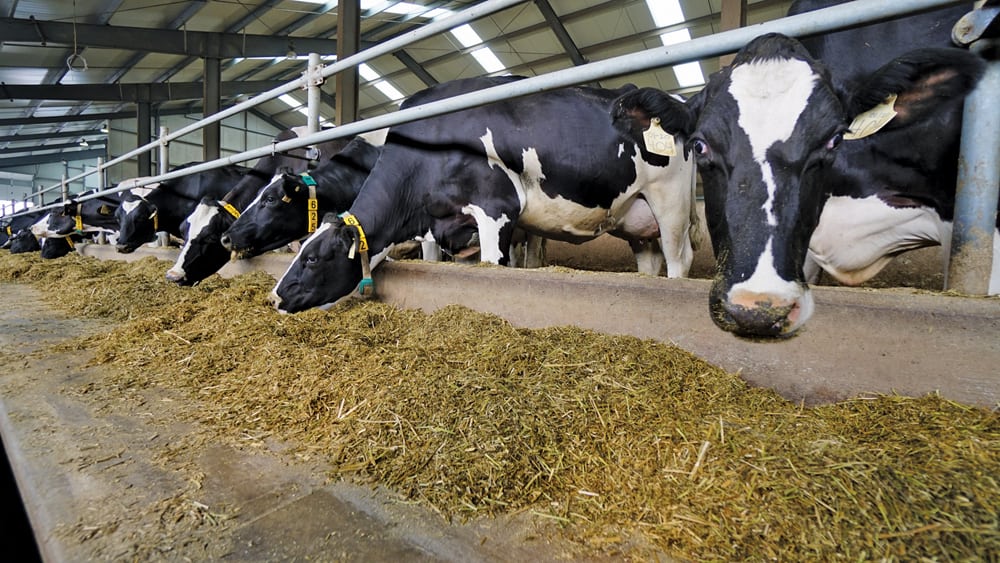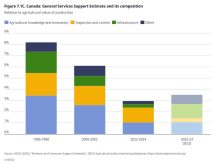Canadian dairy producers say they’ve been thrown under the bus in order for Canada to be part of the new United States, Mexico and Canada Agreement (USMCA) on trade.
Piere Lampron, president of the Dairy Farmers of Canada, says it’s an especially bitter pill to swallow considering Prime Minister Justin Trudeau had repeatedly assured the public it wouldn’t sign a bad deal for Canadians.
“We fail to see how this deal can be good for the 220,000 Canadian families that depend on dairy for their livelihood,” Lampron said in a statement.
Read Also

Trade uncertainty is back on the Canadian national menu
Even if CUSMA-compliant goods remain exempt from Trump’s new tariffs for now, trade risk for farmers has not disappeared, Sylvain Charlebois warns.
Under the deal, the U.S. will gain additional market access equal to 3.59 per cent of the Canadian market, he said. As well it eliminates measures that farmers and processors took to counter a flood of cheap milk powder into Canada.
A request to Agriculture Canada for confirmation about the deal’s impact on dairy farmers had not been responded to as the Manitoba Co-operator went to press.
The result will have a dramatic impact not only for dairy farmers but also for the whole sector, Lampron said.
“The announced concessions on dairy in the new USMCA deal demonstrates once again that the Canadian government is willing to sacrifice our domestic dairy production when it comes time to make a deal,” he said.
“The government has said repeatedly that it values a strong and vibrant dairy sector – it has once again put that in jeopardy by giving away more concessions.”
The increased allocation to the U.S. comes on top of additional quotas granted to European farmers under the free trade deal with the European Union and what will be allowed under the Comprehensive and Transportation Trans-Pacific Partnership.
Those deals sacrificed the equivalent of $250 million annually in dairy production to industries in other countries, he said.
Once again, dairy farmers again paid the price to conclude an international trade agreement, Lampron said, noting the impact would be felt beyond the farm. He said more than 220,000 Canadians depend on the dairy sector for their livelihood, and the sector contributes $20 billion a year to the Canadian economy.
“The livelihood of these thousands of Canadians and the future generations of dairy producers is seriously at risk,” he said.
“Today, the message sent to our passionate, proud and quality-conscious farmers and all the people who work in the dairy sector is clear: they are nothing more than a bargaining chip to satisfy President Trump.”
For consumers, each concession replaces Canadian dairy products, products made with great care by Canadians, using extremely high-quality Canadian milk with no artificial growth hormones, Lampron said.
The USMCA agreement is opening the gate even further by letting foreign products, made according to inferior standards onto the shelves of Canadian grocery stores, he said.
As the Canadian government has said loud and clear that it wants a prosperous dairy sector, Lampron said, “It will be interesting to see how it can reconcile the concessions made in the negotiation of this agreement with its goal of prosperity.”
Down to the wire
The United States and Canada forged a last-gasp deal Sept. 30 to salvage NAFTA as a trilateral pact with Mexico, rescuing a three-country, US$1.2-trillion open-trade zone that had been about to collapse after nearly a quarter-century.
In a big victory for his agenda to shake up an era of global free trade that many associate with the signing of NAFTA in 1994, President Donald Trump coerced Canada and Mexico to accept more restrictive commerce with their main export partner.
Trump’s primary objective in reworking NAFTA was to bring down U.S. trade deficits, a goal he has also pursued with China, by imposing hundreds of billions of dollars in tariffs on imported goods from the Asian giant.
While the new United States-Mexico-Canada Agreement (USMCA) avoids tariffs, it will make it harder for global automakers to build cars cheaply in Mexico and is aimed at bringing more jobs into the United States.
Since talks began more than a year ago, it was clear Canada and Mexico would have to make concessions in the face of Trump’s threats to tear up NAFTA and relief was palpable in both countries that the deal was largely intact and had not fractured supply chains between weaker bilateral agreements.
“It’s a good day for Canada,” Prime Minister Justin Trudeau told reporters after a late-night cabinet meeting to discuss the deal, which triggered a jump in global financial markets.
In a joint statement, Canada and the United States said it would “result in freer markets, fairer trade and robust economic growth in our region.”
Negotiators worked frantically ahead of a midnight ET U.S.-imposed deadline to settle differences, with both sides making concessions to seal the deal. The United States and Mexico had already clinched a bilateral agreement in August.
“It’s a great win for the president and a validation for his strategy in the area of international trade,” a senior administration official told reporters.
Trump has approved the deal with Canada, a source familiar with the decision said. U.S. officials intend to sign the agreement with Canada and Mexico at the end of November, after which it would be submitted to the U.S. Congress for approval, a senior U.S. official said.
Muted reaction
So far reaction on this side of the border has been slow to come.
Ralph Eichler, Manitoba agriculture minister, said there’s no question a deal was important to both the country and province.
“I’m happy that we have agreement — the details of it we’re not sure,” Eichler told the Co-operator. “But certainly this will change the way we are doing business today and tomorrow.”
Eichler said everyone was going to need time to digest the contents of the agreement before its impacts were fully understood.
Cereals Canada welcomed the new deal, nothing that the benefits of free and open trade had long been experienced by all three NAFTA signatories.
“Achieving the agreement will ensure ongoing stability in agricultural trade within North America,” said Cam Dahl, president of Cereals Canada, in a media release. “Agriculture in all three countries has benefited from freer trade. Preserving these benefits was a key objective in these negotiations.”
USMCA will also modernize the agreement in critical areas, including chapters on biotechnology and new plant-breeding techniques and addressing issues of low-level presence. These updates will help bring the agreement up to date with modern technology.
“USMCA also sets the stage for equal treatment by the Canadian grading system for farmers on both sides of the Canada/U.S. border,” noted Dahl. “Again, this is a modernization that addresses issues that did not exist when the original NAFTA was drafted. The Canadian value chain supports these changes.”
– With files from Reuters and Allan Dawson















